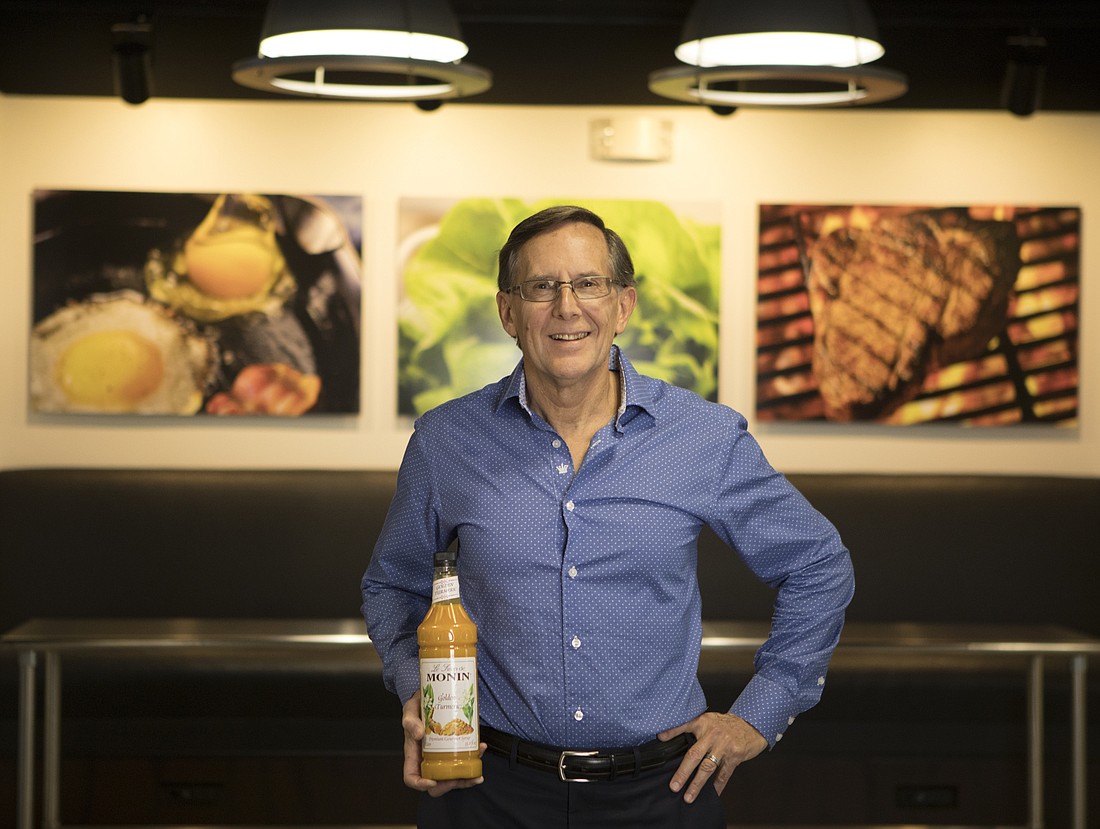- December 22, 2024
-
-
Loading

Loading

The backlash against soda has been a boon for the carbonated water industry, which has soared to revenues topping $2.2 billion in the U.S. alone. This shift in consumer tastes, in turn, has opened a path to massive growth for Monin Gourmet Flavorings, a French company that makes all-natural syrups and flavorings for cocktails and sparkling water drinks — with a U.S. headquarters in Clearwater.
“We do a lot of what we call flavor-forward research. We usually have product made before the market's ready for it.” Bill Lombardo, CEO of Monin Gourmet Flavoring’s U.S. subsidiary
The company, which dates back to 1912, when it was founded by Georges Monin, launched its U.S. export business in 1993. It established a production facility in the U.S. three years later. In 1999, it named Bill Lombardo, a General Mills veteran who helped launch the Olive Garden restaurant brand, as CEO, and he’s been at the helm ever since. He has secured deals with 140 of the nation’s top 200 bar and restaurant chains, in addition to 60,000 independently operated eateries and watering holes.
The firm’s rapidly increasing market share has not gone unnoticed. Monin, for one, has been forced to fend off acquisition attempts. In doing so, executives have learned the art of remaining nimble while growing. Another key lesson: Relentless customer education of the products is paramount.
“Now that we've gotten on the radar screen of much bigger companies, billion-dollar food companies, they’re going, ‘Well, maybe we should be in this business,’” Lombardo, 66, says. “The first thing they do is call and try to see if they can buy us, but we're not interested in selling.”
With a product lineup that exceeds 200 unique flavorings, as well as more than 2,500 recipes it offers to bartenders and mixologists, Monin’s key to success has been to get in on the ground floor of the sparkling beverage boom. Under the guidance of Lombardo and third-generation owner Olivier Monin, the privately held company has seen revenues surge from $84 million in 2016 to $110 million in 2018, up 31%. It expects to reach $130 million in sales this year.
Subsequently, Monin’s payroll has also ballooned: from 20 full-time employees in 1999 to 150 today, including 35 sales staff out in the field. Its 70,000 square-foot headquarters houses an internal innovation center that prioritizes market research by annually surveying between 10,000 and 20,000 consumers to get a sense of emerging trends that will lead to growth.
“We do a lot of what we call flavor-forward research,” Lombardo says. “We usually have product made before the market's ready for it. We have a whole bunch of products on the bench. They're already approved. They've already been shelf tested, and we’ve already industrialized them to the point where we can put them into production quickly if somebody springs forward, if, say, an Olive Garden says, ‘Do you have this?’ We’ll show them some recipes. We’ll build it, and they’ll be like, ‘OK, we’re going to roll that out.’”
A decade ago, thanks to that attentiveness to consumer sentiment, Monin began to sense the rising tide against artificial sweeteners and high-calorie, high-sugar drinks now reshaping the food and beverage landscape. That prompted a big shift that has paid off handsomely as the company has been able to expand into 155 countries. It also operates a 100,000-square-foot warehouse in Largo, and the parent company is building additional production facilities in Russia and India.
“We started moving all of our products to what we call ‘clean label’ with nothing artificial at all — no artificial preservatives, colors or flavors,” Lombardo says. “We followed that with our line of certified organic syrups. There was a whole group of people that wanted that.”
Individual bottles of Monin flavorings cost $9-$12, but the vast majority of the company’s sales — around 97% — come from bulk business-to-business orders. To meet rising demand for direct sales to consumers that has resulted from the popularity of devices including SodaStream, the firm launched an e-commerce site about 10 years ago and sells via Amazon.
“You can buy about 50 of our products via Amazon Prime and get them delivered tomorrow,” Lombardo says.
Apart from the increase in acquisition attempts, the company’s biggest competitive challenge is educating consumers. In addition to surveying consumers, Monin educates sales reps from liquor brands about how its flavorings can be used in cocktails, and it provides complimentary “menu engineering” services to bar and restaurant partners.
“We had to build the market, not take over the market,” he says. “People don't know what to do with the product. But as soon as we show them, they go: ‘Oh, this stuff's great. We can use it here; we can use it there. We can put it in barbecue sauce, in salad dressing.’ That's our biggest opportunity — teaching and training.”